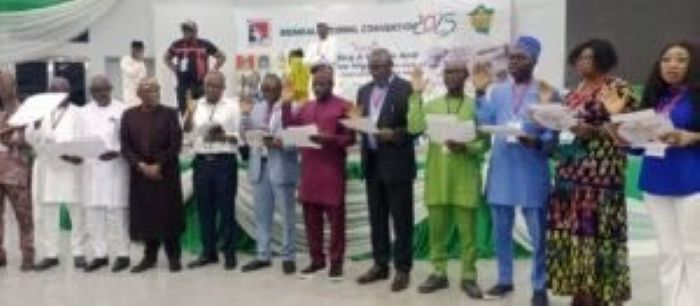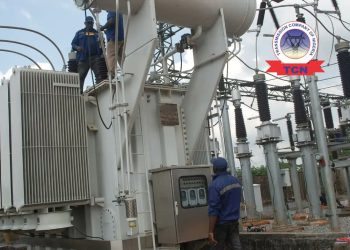By Tony Onyima, Ph.D.
In the cool dawn of Enugu’s rolling hills, delegates from every corner of Nigeria gathered beneath the banner of unity and shared purpose. Here, in the city once known as the Coal City, the Nigerian Guild of Editors convened to chart a course towards a more secure and cohesive nation – one in which dialogue, inclusion, and a fearless media are not lofty ideals, but daily practice. The new and magnificent International Conference Centre hosted this pivotal convention between June 26 and 29, 2025.
Beyond the insightful discussions, the convention also served as a crucial platform for the Guild’s biennial election, where members re-elected Mr. Eze Anaba as President for a second two-year tenure, reaffirming their trust in his leadership.
Mr. Eze Anaba, the President of the Guild, set the tone in his welcome address, acknowledging the nation’s security challenges. He posed critical questions to the assembled editors: “Insecurity in the country compels us to ask hard questions: could the media have done more to promote dialogue and inclusion – essential tools for conflict resolution? Are we, perhaps, sometimes guilty of amplifying fear and sensationalism? Are we presenting all sides of the story fairly? Most importantly, how can we, as journalists and editors, contribute constructively to the peace-building process?” He called on the delegates to interrogate these questions thoroughly.
Enugu’s own story is woven into the very fabric of Nigerian journalism. Dr. John Momoh, Chairman of Channels Media Group, who chaired the conference, reminded the assembly, “This city was the heartbeat of Eastern Nigeria. It was home to some of the bravest voices in the Golden Age of Nigerian journalism”. He recounted how Enugu city, once the press capital of Eastern Nigeria, gave rise to a vibrant tradition of public discourse and anti-colonial journalism with the founding of the Nigerian Outlook and West African Pilot by Dr. Nnamdi Azikiwe. From the pages of Africa Today by Ralph Uwechue to the underground presses of the Civil War, Enugu has always been a “city of memory… a city of journalism”, where ink and paper challenged oppression and demanded accountability. Dr. Momoh stressed that figures like M.C.K. Ajuluchukwu and Uche Chukwumerije “did not just report history; they lived it”.
Against this storied backdrop, Governor Peter Mbah highlighted the press’s enduring role, stating, “You, the Nigerian press, have been a vital companion. You have been the lamp lighting our path and the mirror reflecting our evolving society”. Yet he cautioned that governance “without inclusion is fragile, and democracy without scrutiny is hollow”. In Enugu today, that conviction, Governor Mba said, has driven policies that reach all 260 wards, ensuring “no community is too remote, no citizen too marginal, to deserve dignity and opportunity”. The Governor proudly detailed how each of Enugu’s 260 political wards now boasts a Smart Green School, a Type 2 Primary Healthcare Centre, a 200-hectare Farm Estate, and other projects worth N1 billion, either completed or ongoing. These initiatives reflect a commitment to bridging the divide between urban and rural areas and reducing maternal, under-five, and infant mortality rates, which he disclosed have been reduced “by over 400% in just two years.”
Both speakers returned again and again to the necessity of genuine conversation. “Dialogue is not just about talking. It’s about listening—truly listening”, Dr. Momoh urged, calling on editors to “create space for real conversations across divides—between the young and the old, between communities, between government and the governed”. Governor Mbah added, “How do we ensure the media remains not just a commentator on democracy, but one of its guarantors?”. He emphasised the importance of accountability, stating, “That is why in Enugu, we welcome scrutiny. We have opened our books, processes, and policies to public examination”.
Both speakers insisted that inclusion must transcend tokenism. “Inclusion is not about ticking boxes. It’s about real representation,” Dr. Momoh declared. He stressed that “Too many people still feel invisible. Too many voices still go unheard. Women, youth, persons with disabilities, ethnic minorities — they all deserve a seat at the table”. Echoing this, Governor Mbah affirmed, “We need a media that is inclusive, that gives voice to the margins, that reflects the diversity of Nigeria’s people – not one that dilutes or silences dissent”.
They agreed that security rests upon these foundations. Governor Mbah highlighted Enugu’s cutting-edge Command and Control Centre, which he said has reduced crime by 80% since his administration took office. This proves that transparency and technology can restore public trust with inclusive governance. He spoke of the state’s bold vision for a $30 billion economy, with projects like Enugu Air and the soon-to-be-operational international wing of the Akanu Ibiam International Airport, and efforts to attract three million visitors annually—all underpinned by innovation and inclusion.
As the sun climbed over the Coal City, delegates departed with more than speeches in their conference bags. The editors were particularly reawakened with the security briefing and discussions with the Director General of the Department of State Security Services (DSS). His insightful keynote made the editors resolve to polish the mirror and hold the lamp high, renew dialogue, deepen inclusion, and wield pen and pixel to guide Nigeria toward the promise it has always held. As Dr. Momoh inspired, “The role of the media is not to reflect the nation as it is, but to help shape the nation as it ought to be—just, inclusive, and united”.
Nine new members were admitted to the Guild, and six old members were conferred with Fellow status. No fewer than 350 editors from the print, broadcast and online media attended the conference.









